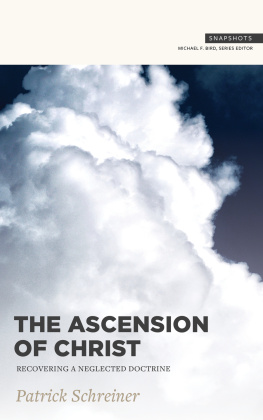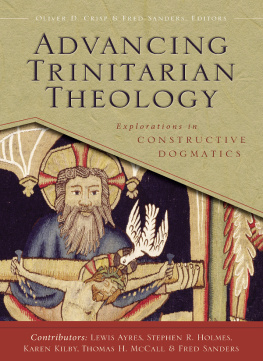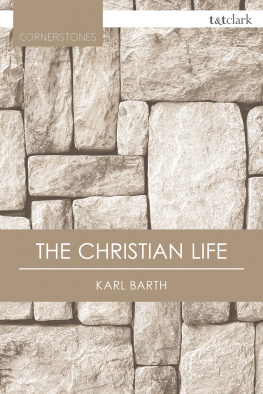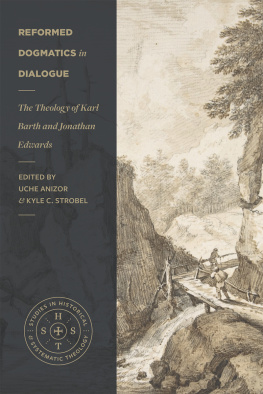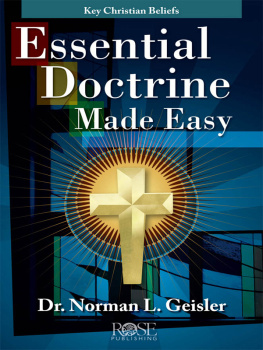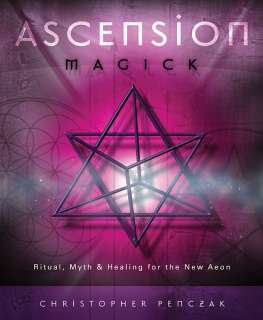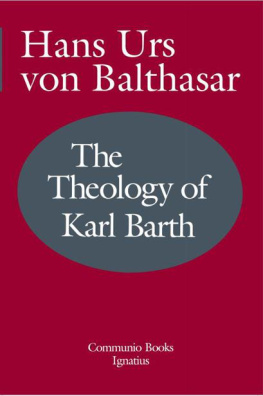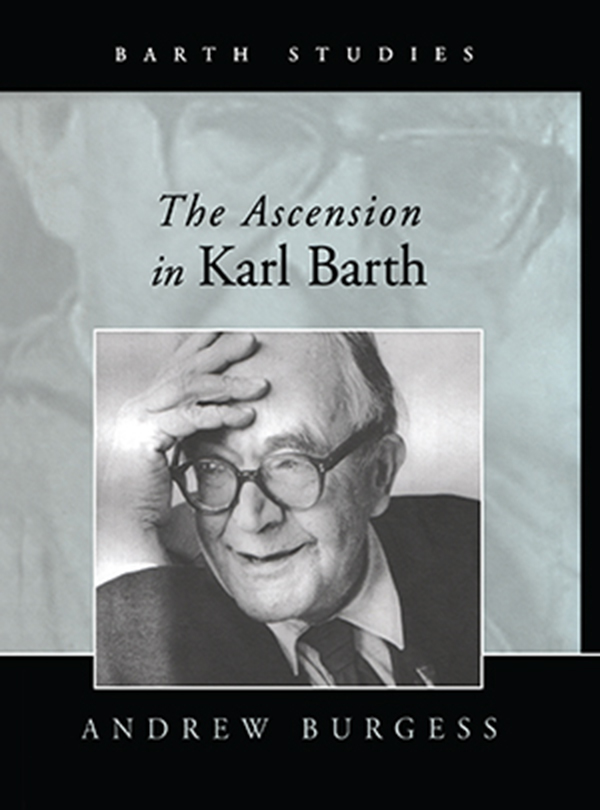Contents
The Ascension in Karl Barth
ANDREW BURGESS
All Saints Anglican Church, Nelson, New Zealand

THE ASCENSION IN KARL BARTH
This book explores the doctrine of ascension, and Barths ascension thought in particular. First, it examines the doctrine of Jesus Christs ascension into heaven, presenting a sustained discussion of Karl Barths approach to this doctrine and the significance of the doctrine within his theology as a whole. Secondly, through examining Barths ascension thought and dialoguing with three other theologians (Torrance, Farrow and Jenson), a clearer understanding of Barth and his theology is achieved. The treatment of issues related to Christs ascension across a broader (protestant) perspective increases the relevance and usefulness of this unique study.
Andrew Burgess presents the doctrine of the ascension as an important and undervalued doctrine and encourages Christians to see how, like Barth, they might benefit in their ability to think coherently about the present age and about Jesus in relation to this age, enabling further thought about the work of the Holy Spirit, the church, and Christian ethics.
First published 2004 by Ashgate Publishing
Published 2017 by Routledge
2 Park Square, Milton Park, Abingdon, Oxon OX14 4RN
711 Third Avenue, New York, NY 10017, USA
Routledge is an imprint of the Taylor & Francis Group, an informa business
Copyright Andrew Burgess 2004
Andrew Burgess has asserted his moral right under the Copyright, Designs and Patents Act, 1988, to be identified as the author of this work.
All rights reserved. No part of this book may be reprinted or reproduced or utilised in any form or by any electronic, mechanical, or other means, now known or hereafter invented, including photocopying and recording, or in any information storage or retrieval system, without permission in writing from the publishers.
Notice:
Product or corporate names may be trademarks or registered trademarks, and are used only for identification and explanation without intent to infringe.
British Library Cataloguing in Publication Data
Burgess, Andrew
The Ascension in Karl Barth. - (Barth studies)
1. Jesus Christ - Ascension 2. Barth, Karl, 1886-1968 - Views on the Ascension
I. Title
232.97
Library of Congress Cataloging-in-Publication Data
Burgess, Andrew R. (Andrew Robert), 1969
The Ascension in Karl Barth / Andrew Burgess.
p. cm. - (Barth studies)
Includes bibliographical references.
ISBN 0-7546-3874-X (alk. paper)
1. Jesus Christ-Ascension. 2. Barth, Karl, 1886-1968. I. Title. II. Series.
BT500.B87 2003
232.7-dc22 2003057770
ISBN 13: 978-0-7546-3874-2 (hbk)
Contents
To Rebecca: with all my love and thanks
Barth Studies
Series Editors
John Webster, Professor of Theology, University of Aberdeen, UK George Hunsinger, Director of the Center for Barth Studies, Princeton University, USA
Hans-Anton Drewes, Director of the Karl Barth Archive, Basel, Switzerland
The work of Barth is central to the history of modem western theology and remains a major voice in contemporary constructive theology His writings have been the subject of intensive scrutiny and re-evaluation over the past two decades, notably on the part of English-language Barth scholars who have often been at the forefront of fresh interpretation and creative appropriation of his theology. Study of Barth, both by graduate students and by established scholars, is a significant enterprise; literature on him and conferences devoted to his work abound; the Karl Barth Archive in Switzerland and the Center for Barth Studies at Princeton give institutional profile to these interests. Barths work is also considered by many to be a significant resource for the intellectual life of the churches.
Drawing from the wide pool of Barth scholarship, and including translations of Barths works, this series aims to function as a means by which writing on Barth, of the highest scholarly calibre, can find publication. The series builds upon and furthers the interest in Barths work in the theological academy and the church.
Other titles in this series
Barth on the Descent into Hell God, Atonement and the Christian Life
David Lauber
Ecclsial Mediation in Karl Barth
John Yocum
The doctrine of Jesus Christs ascension is currently somewhat in vogue. Douglas Farrows recent work on the doctrine to a treatment of the ascension. Torrance is noted for an emphasis on the vicarious humanity of Christ, and this readily leads to an interest in Jesus ascended life and activity. Nonetheless, the doctrine of Jesus ascension has not featured very strongly within the theological framework of most modern protestant theologians. What is it that the ascension has to offer theology, and the church, if we incorporate it more fully into our thought?
Theology has the task of reflecting, obediently, on the reality of God revealed to us in Jesus Christ, the man of Nazareth and the Saviour of the world. Thinking about Jesus therefore exercises control over all other thought, in the sense that the attitude with which we approach all reality must be shaped and over-ruled by faith in Jesus Christ. So for example, Christian thought about the present age of the world even the belief that there is such a thing as the present age of the world, existing between ascension and Christs return! must be formed by attending to Jesus and what impact His reality has upon this age. Dietrich Bonhoeffer was quite right to ask Who is Jesus Christ for us today, but the answer must be found in attending to Jesus Himself, rather than in obedience to the fashions of our time, as so many seem to have taken Bonhoeffer to mean. If Jesus of Nazareth is the risen and active Lord, the One whom Christians are to worship and adore above all others, and moreover the One whose reality is the measure of all other reality, then knowledge of Him is knowledge of the highest and most powerful truth. Thus, to return to our example, to understand the present age of the world it is necessary to understand Jesus ascension and ascended life for it is these theological loci, in full partnership with doctrines such as that of the incarnation, reconciliation, and revelation, that give us the tools to think Christianly about this age. In a time when many feel that Christianity, at least in the west (or north), is in crisis, or suffering a crisis of confidence, reflection on Jesus lordship and activity in the present time, as well as upon the limits of the church in what Barth calls the time between ascension and eschaton (Jesus return at the end), may serve the church very well. Moreover, reflection upon Jesus history as moving toward the end of this age, and the full revelation of His saving power in that ending, can and must also serve to reframe our awareness of Jesus of Nazareth as the one Lord whom we need to know and to serve. If Jesus is the risen and ascended lord, then the future is in His hands, and we do well to seek it there and not elsewhere.
A theology of Jesus ascension is therefore not concerned only, or perhaps even primarily, with a discussion of the event of Jesus ascending itself. Rather, Jesus ascension requires theological attention because it tells us a great deal about whom Jesus is, where He is, and what He is doing in the present age. A theology of the ascension belongs with and informs a theology of Jesus Christs heavenly session (Jesus activity and authority as they are exercised now that He is ascended), so that together these two form more or less one



